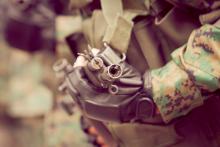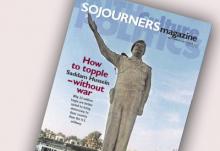Hussein, Saddam

On Palm Sunday many will hear the Gospel of Luke’s perspective surrounding Jesus’ celebrated entry into Jerusalem (Luke 19:28-40). In hearing this well-known portion of the New Testament, we are often led to wonder how the same crowds that so graciously and enthusiastically welcomed Jesus would passionately and viciously call for his death just a few days later. In trying to comprehend the sudden and significant shift in public opinion, we recognize that the crowds did not swing their support independently, but rather, they were acting under the influential push of propaganda.
As Luke’s Gospel reminds us, in between Jesus’ entry into Jerusalem and the calls for his crucifixion, the “chief priests and the scribes” plotted to put Jesus to death (22:2). As these powerful elites were “afraid of the people”, they conspired in a power-protecting push to have Jesus humiliated, tortured, and brutally killed. And so, while Luke’s Gospel does not provide exact details into the strategies of the chief priests and scribes, their motivations appear to be clear, as they, and others within the ruling class, perceived Jesus as a risk and thus needed to ensure his quick and clear elimination. As a result, due to the influential influx of propaganda, combined with an overly complicit public, just a short time after Jesus was welcomed as a king he was sentenced to death as a criminal.

Today, March 19, 2013, is the 10th anniversary of the “Shock and Awe” campaign that was intended to rid the world of the threat of Saddam Hussein’s weapons of mass destruction in Iraq. As it turned out, the threat was a lie. There was ample evidence at the time to prove that the WMDs didn’t really exist, but were manufactured in Saddam’s imagination for political gain.
So why did we fall so easily for this lie? Answers to this question often come via an analysis of the particulars of the Iraqi situation and include discourse about oil fields, geopolitical calculations, even psychological analysis of the relationship of Father and Son Bush. These are good discussions to have. We can learn a great deal from them about our thirst for security and insatiable appetite for oil, political power, and revenge.

"Blessed are the peacemakers, for they shall be called sons [and daughters] of God.”
Matthew 5: 9 from the Beatitudes
I grew up watching casualty reports from the Vietnam War on TV. My Uncle Bill, a lieutenant colonel in the Air Force, was serving there. My family watched the news every evening to learn about the latest casualty reports. I was too young to understand the anxiety of my parents, but I felt the tension while Uncle Bill was deployed.
As an adult, it’s been a different story. I understand and experience things more fully and have an emotional connection to what I see and hear. That has been true for the last decade. Ten years ago, the Iraq War began. Ten years marked by conflict, violence, and loss. Ten years of debate about why we went to war and why we remained. Ten years dealing with death and injury – 4,488 U.S. deaths and 32,321 soldiers coming home with significant injuries. Suicide rates of soldiers are so high it is impossible to ignore – some while in Iraq and others after returning home. Traumatic brain injuries, grieving families, moral injury, and multiple limb loss are just a few of the constant reminders of the tremendous costs of war. The toll on the nation’s economy has been long lasting as well. The jobless rate among veterans is staggeringly high.
The human toll has been significant. But military personnel aren’t the only causalities of this war. Numbers vary, but statistics tell us more than 100,000 Iraqi citizens also have been killed and nearly 3 million have been displaced.
These figures cannot be ignored. And they are the results of war.
The war in Iraq was fundamentally a war of choice, and it was the wrong choice.
Peter Ackerman and Jack DuVall have done an excellent job in clearly demonstrating the power of strategic nonviolent action in overthrowing oppressive regimes such as that of Saddam Hussein.
In November, once again, Iraq responded to a military threat and signaled that it would allow U.N. weapons inspectors to resume their work. This was heartening news.
